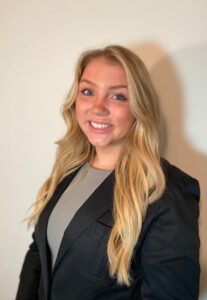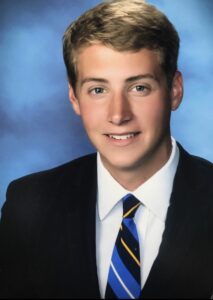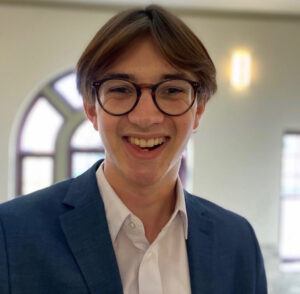By Alli Dayton, Managing Editor
President Miranda Zamora ’23 began Monday’s Senate meeting by reminding attendees that President, Vice President and Inclusion Officer debates would occur after a brief discussion of club reports, student concerns, and budget requests.
Student Concerns
Michael Woods ’25 said that his committee met with the athletics department regarding concerns about the cheer team, but because their concerns were not adequately addressed, Woods submitted the issue as a student concern.
Jack Murphy ’24 voiced concerns about the condition of the sidewalks on West Lincoln Ave. Dom DiLuzio ’26 shared that the Gettysburg Borough owns the sidewalks but requires the owners of the adjacent properties to repair the sidewalks.
Alfredo Roman Jordan ‘26 shared a concern about a frequently overfilled trash can outside of Stine Hall that was removed.
EJ Gill ’23 asked for an update on the student wages opinion that was previously passed. Zamora said that she forwarded the opinion to President Iuliano but did not receive a response.
Maddie Maier ’26 shared a concern about a side door in Rice Hall that does not have key card swipe access.
Another senator asked about individuals driving around campus and yelling racial slurs. DiLuzio noted that students should call 9/11 if this occurs.
Budget Requests
Alex Rosado ’24 requested a budget of $537 on behalf of College Republicans for members to attend the Adams County Republican Committee Legislative Dinner. Rosado shared that he asked the Adams County GOP for a discount and a 50% discount was provided, resulting in an amended request of $270.
After a discussion about the exclusivity of the event and the constitutionality of donating to a political party, a senator recommended that the club use its base budget to reduce the requested amount to $170. Zamora then commenced a voice vote, and a budget of $170 passed.
Presidential Debate
Zamora then introduced the debate moderators Executive Director of the Eisenhower Institute Tracie Potts and Gettysburgian Editor-in-Chief Katie Oglesby ’23.
Following the introductions, Oglesby shared the rules for the debate.
Potts then introduced the candidates for president, Drew Lemon ’24 and Evelyn Datte ’24. She began the questions by asking the candidates why they chose to run and about their goals.

Evelyn Datte ’24 (Photo provided)
Datte began by discussing her experiences as secretary of Senate and as the president of the class of 2024. She then explained the importance of addressing the needs of students.
“I think that the most important things are to act on the…concerns of students in meetings and to…find ways to involve everyone in these conversations,” said Datte.
Lemon explained his three years of experience in Senate and his two years as the College Life Advisory Committee (CLAC) Chair.
Regarding his goals, Lemon said, “I want to be able to improve relationships with…the upper administration of the college…and to build a better network of relations between the Senate.”
Next, Oglesby asked the candidates about what sets them apart from each other.
Lemon cited the printing and bike share projects he organized through CLAC that gave him “ample opportunities to be able to meet members of the administration.”
Datte again described her experiences as secretary and class president that demonstrated her ability to take initiative.
Potts then asked candidates about their top priority for student leadership to address.
Datte discussed the importance of listening to student concerns. She commended the work that committees do to create relationships between the administration and students.

Drew Lemon ’24 (Photo provided)
Lemon explained that from his perspective, the largest issues Senate faces are difficulties with relationships and a lack of transparent communication with the administration. “Internal disputes between members have often gotten in the way of…how we represent members of Gettysburg,” said Lemon.
Then, Oglesby asked about skills the candidates possess that signal their abilities to form relationships with the administration.
Lemon referred back to his experience overseeing projects through CLAC. He shared, “Seeing projects from the beginning to the end, dealing with all relevant stakeholders and problems that may arise is one of the most important ways to deal with administration.”
Datte referenced her experience as the secretary, where she formed several key relationships with administrative figures.
“I was specifically in charge of bringing those individuals into Senate,” Datte stated. She also discussed her connections with alumni as class president.
Potts then asked each candidate about one thing they hoped to improve on campus.
“One thing I think we can approve…is restoring integrity to the Senate,” said Datte. She explained that students often do not respect Senate’s work and that she hopes to improve this perception by publicizing Senate’s positive contributions to the campus.
Lemon voiced his agreement with Datte’s statements. He added that Senate must learn how to communicate better with clubs that do not understand Senate’s functions and that senators must learn to compartmentalize their work.
Oglesby questioned what the candidates planned to bring to the role of president that would make Senate more effective.
Datte began, explaining that she would prioritize, “putting out an expectation that there will be solutions to problems.”
Lemon highlighted the importance of “a positive attitude and good people skills.”
Potts asked what Lemon and Datte believed the role of Senate should be in improving student safety on campus.
Lemon discussed several types of safety that Senate should value, “physical safety, academic safety, and safety of thought.” Lemon continued, “Student Senate plays a very integral role in being able to bring voices to the table of different perspectives.”
Datte agreed with Lemon’s sentiments and added, “our job as student leaders [is to] take [students’] concerns and for them to be able to walk away and know that we’re going to take care of those.”
Finally, Oglesby asked candidates what they learned from Zamora’s presidency.
Lemon stated that he learned the importance of patience and “a calm and controlled temperament” from Zamora. Datte explained that she admired Zamora’s composure, dedication, and “ability to demand respect.”
Potts then requested that audience members ask questions of the candidates.
DiLuzio asked about how the candidates planned to advocate for student concerns with the administration.
Datte answered with a description of the meetings the president initiates in response to student concerns. “I think really demanding answers and demanding paths forward is the way to ultimate change,” said Datte.
Lemon stated that “The best way to advocate for students and to be able to get what you want, is to compromise.” He provided CLAC’s bike share program as an example of his ability to advocate for student desires and compromise with the administration.
Klatt asked what the candidates’ greatest challenges have been in Senate and how they have addressed them.
Lemon discussed his experience balancing diverse student perspectives with his own thoughts, while Datte talked about overcoming issues during projects by keeping the end result in mind.
Murphy asked about how the candidates intended to address internal conflicts within Senate.
Datte shared the importance of “setting an expectation of respect,” among Senate members. “Senate is the wrong place for drama,” she said.
Lemon stated, “dealing with the issues internally…may be contributing to part of the problem.” He suggested that Senate bring in an outside faculty member to resolve internal problems.
Roman Jordan asked about increasing the diversity in Senate.
Datte discussed the importance of supporting the inclusion officer by providing them with necessary resources. She shared her vision that Senate “is and should always be a safe space where everyone should be able to come and share ideas.”
Lemon explained his desire to encourage underrepresented communities to participate in Senate through regular meetings with the Inclusion Officer.
Dipto Provas ’25 asked about ensuring accountability for Senate to the student body.
“I really think it starts with establishing a connection,” said Lemon. “There’s a substantial lag between what the Senate thinks…what the student body thinks…and what the administration thinks.”
Datte talked about hosting office hours to engage with students outside of Senate who may have concerns to discuss.
Potts concluded by asking for a round of applause for the presidential candidates before transitioning to asking questions of vice presidential candidate Geoffrey Meadville ’25, who is running unopposed.
Vice Presidential Town Hall

Geoffrey Meadville ’25, candidate for Vice President (Photo provided)
Potts began by asking current Vice President Geoffrey Meadville why he chose to run again.
“I still think there’s a lot of unfinished work that I didn’t get to finish this year,” said Meadville. “I just want to continue what I’ve been working on.”
Oglesby asked about Meadville’s qualifications to run meetings, given the Constitutional changes to the vice president’s position that would make the vice president run the meetings instead of the president.
Meadville cited his experience in high school student government and his knowledge of Robert’s Rules.
Next, Potts questioned what Meadville believed should be Senate’s top priority.
Meadville stated that Senate experienced challenges following the pandemic, but “it’s time to get back to…that external work that we need to be doing.”
Oglesby then asked about Meadville’s experiences on campus that qualify him for the role.
“I have met with Miranda and Jon [Allen] and learned what it is to do this job,” Meadville responded. “Also, I have talked to different students on this campus and really tried to learn what they’re looking for.”
Potts asked about one specific thing that Meadville wished to improve on campus. Meadville answered by referencing the lack of trust between the student body and Senate that he sought to rebuild.
Oglesby questioned what Meadville would bring to the role to increase the effectiveness of Senate. Meadville discussed his “positive attitude” and “ability to listen.”
Potts ended by asking Meadville about his thoughts on Senate’s role related to safety.
“We are an advisory body…so it’s a lot of education…a lot of stuff talking about what to do if you’re feeling unsafe,” said Meadville.
Oglesby then shifted to taking questions from the audience.
A senator began by asking how Meadville planned to improve diversity. Meadville explained his choice to contact administrators like Cristina Garcia to encourage diverse groups to run for Senate positions this year.
Murphy questioned Meadville about his proudest accomplishment in his role this year.
“My biggest accomplishment was definitely cleaving the presidential role in half,” shared Meadville.
Zamora asked how Meadville planned to facilitate productive meetings.
Meadville responded, “Everyone who is elected to this body is here to do work, so if we need to be here for two hours, we should be here for two hours.” Meadville also suggested using Robert’s Rules to facilitate more productive discussions.
DiLuzio asked about using the power Senate currently has to be a more effective advisory body. In response, Meadville talked about increasing dialogue between Senate and administrators.
Inclusion Officer Debate

Abby Ruggiero ’26, candidate for Inclusion Officer (Photo provided)
Potts then shifted to a discussion with Inclusion Officer candidate Abby Ruggiero ’26. She asked about why Ruggiero chose to run and about what her goals would be in the position.
Ruggiero discussed stereotypes about Senate that exist among students that she hopes to reduce. She also stated that she wants to ensure that all students feel welcome on campus.
Oglesby asked about Ruggiero’s experiences that would make her a good inclusion officer.
Ruggiero began by talking about her experiences as a Campus Safety student patrol officer and as the Senate social affinity group leader. She continued, “I also like to advocate for LGBTQ+ students…because I am one and I have a lot of close friends that are…of marginalized groups.”
Potts questioned the meaning of inclusion for Ruggiero. “Inclusion means everybody to me,” responded Ruggiero. “Students should feel their voices are represented correctly.”
Oglesby asked about what Ruggiero hoped to bring to the position.
“I want to continue to work with the administration,” said Ruggiero. “I’ve already started working with Bob…to help LGBTQ+ students feel more welcomed and safe on this campus.”
Potts asked specifically how Ruggiero planned to reach out to underrepresented groups.
Ruggiero talked about her desire to communicate with underrepresented groups during orientation. “You can have student representatives come from Senate and talk about their experiences and say how you can get involved in Senate,” she explained.
Oglesby then asked about Ruggiero’s philosophy of freedom of speech.
Ruggiero shared that while believes everyone should be able to speak freely, “there is a big problem on campus where people are spreading harmful and false ideologies.”
The discussion then moved on to questions from the audience. Ella Prieto ‘26 asked how Ruggiero planned to handle harmful rhetoric being spread within Senate.
Ruggiero stated that all members of Senate should understand “respect rules…that we’re going to hold everybody to so that nobody feels disrespected…or harmed by anybody’s words.”
Murphy followed with a question about negative perceptions of Senate’s lack of diversity.
Ruggiero responded with her solution, “doing more Senate events so that people can get to know their student senators so that they are more comfortable with talking to them.”
DiLuzio then asked how Ruggiero planned to measure her success as the inclusion officer. Ruggiero stated that she hopes to diversify Senate and ensure that all students are listened to.
Roman Jordan asked about barriers Ruggiero planned to remove that may prevent students from diverse backgrounds from joining Senate.
Ruggiero discussed her own apprehension about joining Senate as a first-year student. “I think a really big roadblock is those harmful stereotypes of Senate,” she added.
Lastly, a senator asked about the line between free speech and harmful rhetoric. Ruggiero stated that the administration is responsible for fixing this issue, in collaboration with student senators.
Potts followed up on Ruggiero’s response to her question about inclusion by asking how Ruggiero planned to include the voices of all students.
“Once you’re here, you learn your voice and your place,” answered Ruggiero.
Potts concluded by thanking students for attending and participating during the debates.
Zamora reminded attendees that she planned to email the link to vote at 9 p.m. She then adjourned the meeting.
